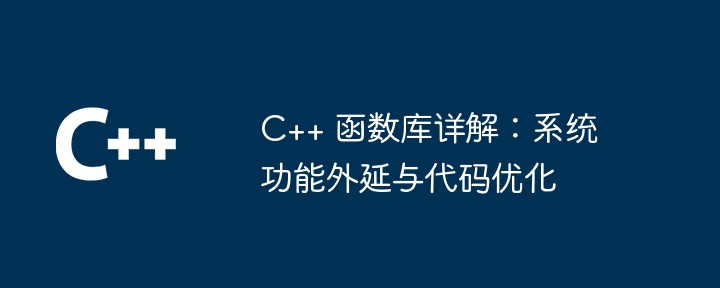Home >Backend Development >C++ >Detailed explanation of C++ function library: system function extension and code optimization
Detailed explanation of C++ function library: system function extension and code optimization
- 王林Original
- 2024-05-01 10:51:01923browse

Detailed explanation of C function library: system function extension and code optimization
Introduction
C function Libraries are collections of predefined functions that extend the functionality of the C language and enhance its capabilities and ease of use. These libraries cover a wide range of functionality, from input/output operations to complex algorithms. By leveraging function libraries, developers can save time, reduce code redundancy, and write simpler and more efficient programs.
1. Input/output function library
-
317e6b6395ab75e70e7f0880af8f6835: Provides standard input/output stream -
f5929b6204e11caeaac1cf695feb5d4d: used for file input/output -
3f68df5471146346142495b14e43a419: control output format -
05c4a2ef104d6413ac6c528ca5aae720: operate string -
b9d007fdd0a9230760ee80bd9f78ebf5: convert characters Streaming and variable interaction -
8b2d503d09b38f6c300ed08e7e08a623: Regular expression matching -
e23c27865115669ba6cc99530e9d22b3: Provides string operation algorithm
Practical case: finding substrings
#include <string>
int main() {
std::string str = "Hello, world!";
std::size_t found = str.find("world");
if (found != std::string::npos) {
std::cout << "Found \"world\" at position " << found << std::endl;
} else {
std::cout << "\"world\" not found" << std::endl;
}
return 0;
}3. Container function library
-
7d10b7d419803d4062679b4587905232: dynamic array -
4309a73696dbaeac0ddd115cebb6f9b7: doubly linked list -
dab9f699790ab0922e596ecb9f6677d5: associative array -
ace372f96ca3ec664acb3aaa2421b04c: Ordered set
Practical case: Create and traverse vectors
#include <vector>
int main() {
std::vector<int> numbers = {1, 2, 3, 4, 5};
for (int num : numbers) {
std::cout << num << " ";
}
std::cout << std::endl;
return 0;
}4. Algorithm function library
-
e23c27865115669ba6cc99530e9d22b3: common algorithms, such as sorting, search and operations -
8ff8f0891976e8c430157dde469bf924: Numerical calculation algorithm -
ae60ea20068672260f4d24c8d73e974d: Random number generation algorithm -
da2c3d4ec9d0ede5770d8970d3e75edc: Function object and function adapter
Practical case: Sorting vectors
#include <algorithm>
#include <vector>
int main() {
std::vector<int> numbers = {1, 3, 2, 4, 5};
std::sort(numbers.begin(), numbers.end());
for (int num : numbers) {
std::cout << num << " ";
}
std::cout << std::endl;
return 0;
}5. Other function libraries
-
db812ea0642daad3bc50a8f6e7d86ab2: Time and date operations -
d9596a16820e64f890bca1471ad4941f: File system operations -
61fe42cd48946e53c78c0e2bbfbc7b04: Multi-threaded programming -
e57bfaee39f2b4342f13553bc6334c96: Memory management
Optimize code through function library
Function library Provides pre-implemented code as an alternative to custom solutions. This can significantly reduce code redundancy and improve readability and maintainability. In addition, the function library is optimized to be fast and efficient, thereby improving the performance of the application.
Conclusion
Function libraries are a powerful addition to the C language, providing developers with a wide range of functionality. By taking advantage of function libraries, you can extend the capabilities of C and write simpler and more efficient programs.
The above is the detailed content of Detailed explanation of C++ function library: system function extension and code optimization. For more information, please follow other related articles on the PHP Chinese website!

